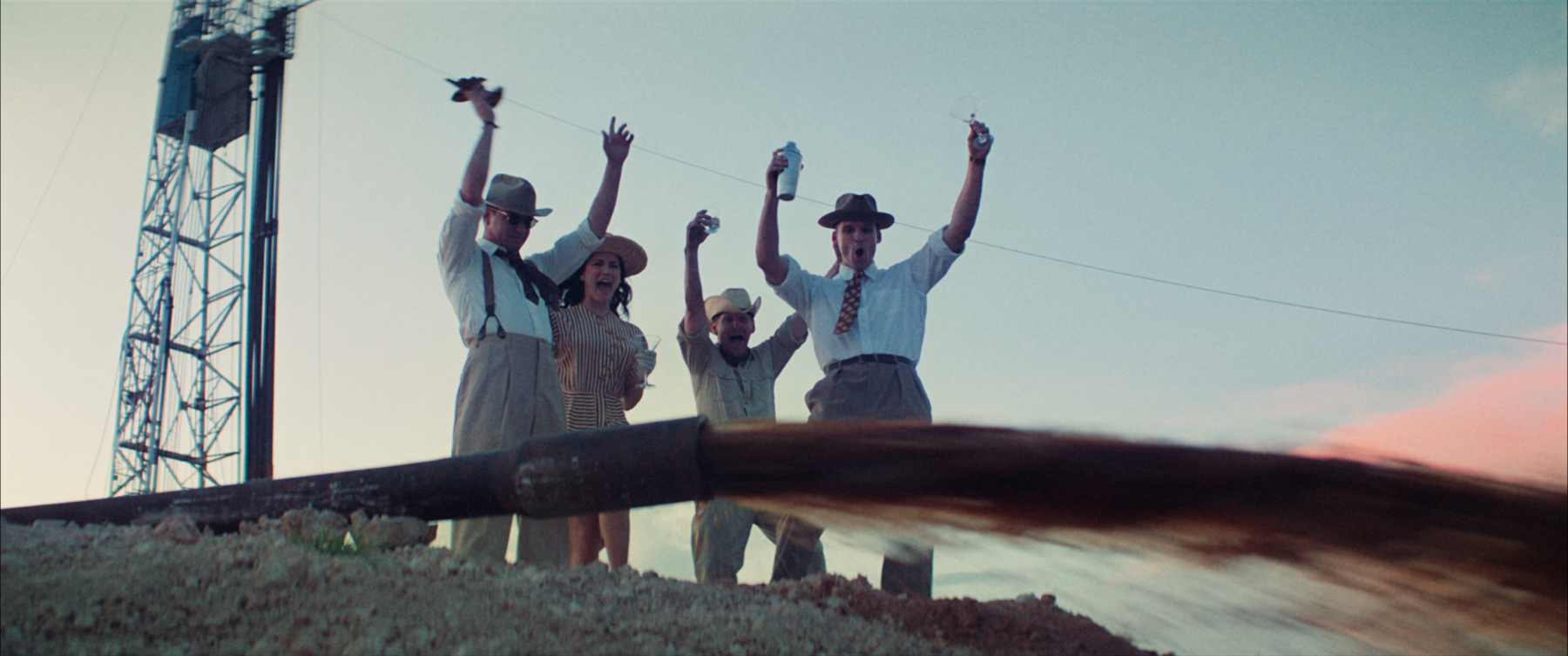
A still from The Iron Orchard
West Texas wildcatters have long been mythologized on screen in classic films like Giant and There Will Be Blood. This month, The Iron Orchard follows in those footsteps with its dramatic tale of greed, lust, and hunger during the oil boom of the 1930s through ’50s.
The Iron Orchard is based off a novel of the same name written by Tom Pendleton (a nom de plume of Fort Worth writer and oil producer Edmund Van Zandt). The book caused a stir when it was published in 1966 and has since become a beloved classic for many in the Texas oil industry—in fact, a group of oilmen subsidized the independent film, directed by Midland native Ty Roberts.
The story follows Jim McNeely (played by Lane Garrison), a poor but confident young roustabout who eventually becomes an oil baron. After striking liquid gold a couple of times, he eventually runs out on his luck and falls into desperation, hard times, and tragedy. The film received the Audience Award at the 2018 Austin Film Festival.
The Iron Orchard will screen in Odessa, Midland, Lubbock, and Big Spring on Feb. 22 before heading to larger markets like New York City and Los Angeles and other Texas cities like McAllen, El Paso, and Tyler on March 1.
We spoke with screenwriter Gerry de Leon, an Austin native who resides in Los Angeles, about adapting the novel, and spending time at filming locations in West Texas and Austin.
How did you get involved in this project?
[Director and co-writer] Ty Roberts and I had been friends, and he heard about the book from a friend of his father. I bought the book and read it and loved it. Ty and I teamed up together—at the time it was just me adapting the screenplay pretty much on my own and with his help developing it—and then once we got a draft that we felt good about, we started trying to get it made. When you’re a writer these things kind of leave you, and the producers take it and try to do what they can. Years went by, and I’d get a call to come work on the script a little bit more. Finally, it got some real momentum and got made, which was amazing to have written it a few years back and see it come to reality.
Before reading the book or working on this screenplay, what did you know about wildcatting or drilling for oil in Texas?
Very little, kind of what you see in the movies. I was a fan of Giant. I knew a little bit about the oil business just from living in Texas, but not that much about the history of it, so that was a learning experience. Along with the book, just doing research and finding out about that whole world.
What are the challenges that come along with adapting a novel?
One of the biggest challenges is wanting to do right by the author. Obviously, a film is its own piece of work and it should become something else, but I felt an obligation to be faithful to the work. I came to understand very quickly that there was a love of this book by a lot of people, especially out in West Texas, so that was always on my mind. This novel in particular, there’s a lot of story in it, a lot of characters, and this journey that Jim McNeely goes on that starts with flashbacks to when he was a kid to his early-mid 40s. Trying to condense all of that into a screenplay had its challenges.
Why is this story relevant today?
Hopefully what resonates is the love story [between Jim McNeely and Lee Montgomery], and how everybody has wants and needs in life, and the way to get them isn’t always clear. Watching a fallible person make mistakes and try to somehow redeem themselves or make sense of life. When I watch movies or read books, if there’s a story that sort of speaks to humanity in any way shape or form, I resonate with it.
What character did you identify with most in the book?
I think [I identified] with the main character [Jim] the most. The journey of him trying to prove himself to the world and to the people around him. As a writer, that’s pretty much the same game.
What do you think about the movie screening in West Texas before it’s shown elsewhere?
I think this is a unique film, and the way it’s being distributed is unique. Hopefully it reaches an audience that is going to really spark to it. I think the filmmakers had it in mind to make a movie for Texans, so I think it’s a great thing.
What was it like being on set?
It was great. Writers aren’t always invited out to set. I was already friends with Ty and with Houston [Hill] the producer, and became close to the others out there very quickly. It was a very collaborative experience. I learned a lot and was able to interact with some of the actors, which doesn’t always happen. Anytime a writer sees their words come to life in a way they envisioned—or better—is always an exciting and fun experience. My mom came out and was able to watch, and then she played extra on set one day.








